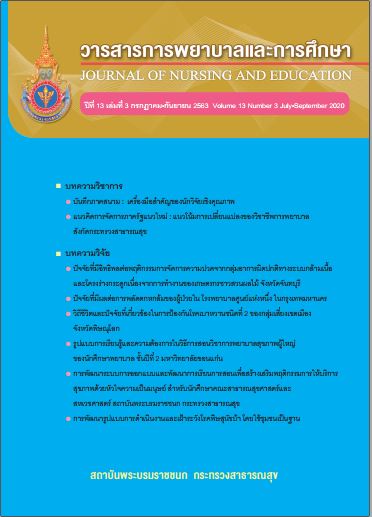แนวคิดการจัดการภาครัฐแนวใหม่ : แนวโน้มการเปลี่ยนแปลง ของวิชาชีพการพยาบาล สังกัดกระทรวงสาธารณสุข
New Public Management Concept : Trends of Nursing Professional in Ministry of Public Health
คำสำคัญ:
การจัดการภาครัฐแนวใหม่, ระบบสาธารณสุข, พยาบาลวิชาชีพบทคัดย่อ
แนวคิดการจัดการภาครัฐแนวใหม่ เป็นแนวคิดที่มุ่งผลสัมฤทธิ์ และผลลัพธ์ของงาน โดยมีองค์ประกอบที่
สำคัญ 7 ประการ ได้แก่ 1) การจัดการโดยนักวิชาชีพที่มีความชำนาญ 2) มีมาตรฐานและการวัดประสิทธิภาพ
ของงานที่ชัดเจน 3) ให้ความสำคัญกับผลลัพธ์ที่มากขึ้น 4) แยกหน่วยงานภาครัฐออกเป็นหน่วยย่อยๆ 5) ปรับ
เปลี่ยนให้เกิดการแข่งขันภาครัฐมากขึ้น 6) เน้นการจัดการแบบภาคเอกชน และ 7) เน้นการใช้ทรัพยากรอย่าง
มีวินัยและประหยัด การจัดระบบสาธารณสุขได้นำมาประยุกต์ใช้กับการบริหารจัดการเพื่ออำนวยความสะดวก
ลดความแออัดและระยะเวลารอคอยของผู้รับบริการจากสถานบริการที่อยู่ในความดูแลของกระทรวงสาธารณสุข
ส่งผลให้พยาบาลวิชาชีพซึ่งเป็นผู้ให้บริการต้องมีการปรับรูปแบบการให้บริการพยาบาล และพัฒนาตนเองให้
เป็นผู้ที่มีความเชี่ยวชาญมากขึ้น
บทความนี้มุ่งเน้นการนำเสนอแนวคิดการจัดการภาครัฐแนวใหม่ ทิศทางการให้บริการของ ระบบ
สาธารณสุขตามแนวคิดการบริหารจัดการภาครัฐแนวใหม่ แนวโน้มการเปลี่ยนแปลงกับ วิชาชีพการพยาบาล
เพื่อเตรียมความพร้อมของพยาบาลวิชาชีพ สังกัดกระทรวงสาธารณสุข สำหรับ การวางแผนการปฏิบัติงาน
และการให้บริการสุขภาพแก่ผู้รับบริการ
เอกสารอ้างอิง
1. Panyasiri C. Management Paradigm of Thai
Public Organization: A Comparison Between
New Public Management (NPM) and New
Public Service (NPS). Siam Academic Review.
2017; 18(1): 1-20. (in Thai).
2. Office of the Public Sector Development Commission. Handbook of Technique and New
Management in Govern Management Guideline: Public Management. Bangkok: The Institute; 2006. (in Thai).
3. Office of the Civil Service Commission. Government Management in Thailand 4.0 Context
[Online]. 2017 [cited 2020/01/04] Available
from: https://www.ocsc.go.th/sites/default/
files/attachment/article/4._rabbraachkaaraithyainbribthaithyaelnd-4-0.pdf. (in Thai).
4. Strategy and Planning Division. Twenty-Year
National Strategic Plan for Public Health
(2017-2036) First Revision 2018. Nonthaburi:
Office of the Permanent Secretary; 2018. (in
Thai).
5. Pitakkamonporn S, Kowpoothai S, Seema C,
Osan P. Guidelines for organizing Consultations: Unite the Power of Perception to Help
the Nation Fight the COVID 19 Disaster in
Cluster. Nonthaburi: National Health Commission Office; 2020. (in Thai). Bureau of Information Office. The Ministry of Public Health:
Carry forward Smart Hospital on Thailand 4.0
Policy [Online]. 2018 [cited 2020/01/04]
Available from: https://pr.moph. go.th/?url=pr/
detail/2/04/119047/. (in Thai).
6. Suwanasaeng N, Yingyoud P. Primary Care
Cluster: Concept and Management of Registered Nurses’ Roles. Thai Journal of Nursing
Council. 2020; 35(1): 5-17. (in Thai).
7. Hood C. A Public Management for all Reason?
[Online]. 1991 [cited 2020/02/04] Available
from https://onlinelibrary.wiley.com/doi/
epdf/10.1111/j.1467-9299.1991.tb00779.x
7. Office of the Public Sector Development Commission. Handbook of Technique and new
Management in Govern Management Guideline: Citizen Centered Approach. Bangkok: The
institute; 2006. (in Thai).
8. Office of the National Economics and Social
Development Council. Annual Report 2019 in
Health Strategic. Bangkok: Office of the
National Economics and Social Development
Council; 2020. (in Thai).
9. Sahunphun P. The process of referral system
between hospitals. Hua Hin Sook Jai Klai
Kangwon Journal. 2019; 4(1): e0051. (in
Thai)
10. Risling T. Educating the Nurses of 2025:
Technology Trends of the Next Decade. Nurse
Education in Practice. 2017; 22: 89-92.
11. Poomyeewha W. The Usage of Information
Technology of Registered Nurses in Private
Hospital. Udonthani Rajabhat University Journal
of Sciences and Technology. 2019; 7(1): 17-
31. (in Thai).
12. Mc Cabe T, Sambrook S. A Discourse Analysis of Managerialism and Trust Amongst Nursing Professionals. The Irish Journal of Management. 2019; 38(1): 38-53.
13. Stevens KR. The Impact of Evidence-Based
Practice in Nursing and the Next Big Ideas.
Online J Issues Nurs. 2013; 18(2): 4.
14. Sathagathonthun G, Kornpuang A. The Causal Relationship Model of Job Retention for
Nurses in Government Hospitals. Nursing
[Online]. 2018 [cited 2020/04/15];12(1S):58-
4. Available from: https://he01.tci-thaijo.org/
index.php/NurseNu/article/view/148853. (in
Thai)






